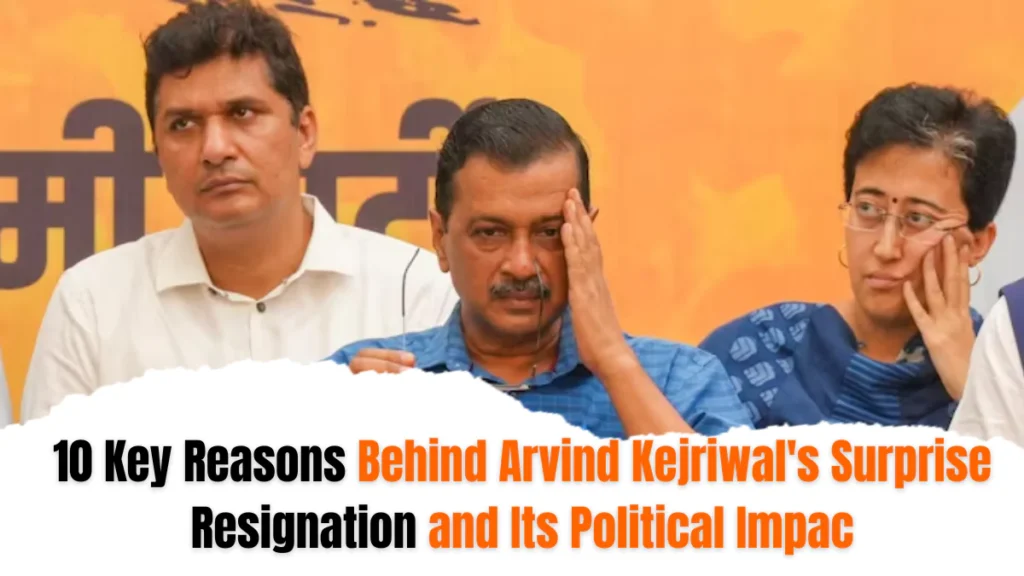
Arvind Kejriwal’s unexpected announcement of Resignation as Delhi’s Chief Minister, despite being released from Tihar Jail, has created a significant stir in the political landscape. His decision, rather than being a surrender, is seen as a strategic move aimed at multiple political benefits that could strengthen both his position and his party,
the Aam Aadmi Party (AAP), in the upcoming elections. Here’s a detailed analysis of the reasons behind this move and its potential implications:
1. Strategic Timing: Early Elections to Regain Momentum
The Delhi Assembly elections were initially scheduled for February 2025, but with less than five months to go, Arvind Kejriwal’s resignation and call for early elections in November 2024 align with his broader strategy to stay ahead of any political or legal hurdles. He aims to ride the wave of public sympathy, particularly after his release from jail, and capitalize on the momentum generated by his return to the public eye.
Resigning early could allow Kejriwal to campaign as a leader who is facing legal scrutiny with courage, turning his political challenges into an opportunity for renewed public support. By stepping down now, he seeks to prevent any wear and tear caused by anti-incumbency and minimize potential damage from ongoing legal battles.
Electoral Advantage: With November elections aligning with other key state elections like Maharashtra and Jharkhand, Kejriwal aims to benefit from broader national narratives against the BJP. He seeks to capitalize on the opposition’s anti-BJP sentiment across multiple states, ensuring that the political momentum also resonates in Delhi’s electoral campaign.
2. Clearing the Corruption Allegations: A New Mandate
One of the main reasons for Kejriwal’s decision to resign is the ongoing corruption allegations against him, especially the excise policy case involving senior AAP leaders like former Deputy CM Manish Sisodia. AAP was born out of an anti-corruption movement, and these allegations have been a significant challenge for the party, which prides itself on clean governance.
By resigning, Kejriwal aims to turn the election into a referendum on his honesty and leadership, effectively putting the corruption accusations to the public court. His narrative of resignation as an “agnipariksha” (trial by fire) positions him as a leader who is not afraid to face the people’s judgment, rather than clinging to power under scrutiny.
Public Sympathy: Kejriwal’s strategy is to use this resignation to gather sympathy and trust from the electorate. His message is clear: he is willing to sacrifice his position to clear his name and seek the public’s approval. This may shift the focus from the corruption charges to his willingness to take personal risks for the sake of his party and principles.
3. Preempting Anti-Incumbency and Revamping AAP
After being in power for nearly a decade, AAP faces the inevitable challenge of anti-incumbency. Kejriwal has been the face of the party since 2013, and a decade of governance can create voter fatigue. By resigning and seeking a fresh mandate, Kejriwal hopes to mitigate the effects of anti-incumbency and offer voters a renewed vision for Delhi.
New Leadership Face: Resigning allows Kejriwal to reset the clock on AAP’s governance by offering a new leadership face for a brief period before the elections. However, everyone knows that the new CM will function under Kejriwal’s direction, keeping him in control of the party’s strategy while allowing AAP to present a fresh team for the election.
This move also gives Kejriwal the chance to reinvent AAP’s image, focusing the campaign on the party’s achievements, such as education, healthcare, and infrastructure development, instead of lingering on the corruption allegations and governance challenges of the past few years.
4. Leveraging National Political Climate: Gaining from Anti-BJP Sentiment
The political landscape in India post-2024 Lok Sabha elections has been increasingly charged, with growing opposition to the BJP-led central government in several states. Kejriwal’s call for early elections in Delhi comes at a time when key states like Maharashtra and Jharkhand are also heading to polls, which gives him an opportunity to amplify his campaign by tapping into the larger anti-BJP sentiment.
Opposition Synergy: Kejriwal’s move is strategically timed to align with broader opposition attacks on the BJP in states like Maharashtra, where the ruling BJP faces several challenges, including the Maratha reservation issue. In Jharkhand, the opposition’s push to wrest control from the BJP adds to this narrative. By holding Delhi’s elections around the same time, Kejriwal could benefit from a coordinated opposition strategy, making the Delhi election a battleground where national issues also play a crucial role.
The AAP hopes to leverage the anti-BJP rhetoric, positioning itself as part of the larger opposition bloc, which could help it in the Delhi Assembly elections. This synchronisation of narratives is likely to strengthen Kejriwal’s appeal as a leader who stands against central government overreach and BJP’s alleged vendetta politics.
5. Avoiding Central Rule in Delhi
One of the most critical factors behind Arvind Kejriwal’s resignation could be the looming threat of President’s Rule in Delhi. During Kejriwal’s jail term, BJP leaders had repeatedly demanded the imposition of central rule, arguing that Kejriwal’s absence and legal troubles were causing governance issues in the capital.
Had Kejriwal remained in office while under the restrictions imposed by the Supreme Court’s bail conditions, there was a significant risk of the central government stepping in, further delaying elections and potentially weakening AAP’s electoral position.
Preemptive Strike: By stepping down, Kejriwal avoids the imposition of President’s Rule and retains control over the political narrative in Delhi. His decision to quit and call for early elections prevents the central government from taking charge and ensures that AAP remains at the forefront of governance decisions until the elections are held.
This move also helps Kejriwal distance himself from governance paralysis, ensuring that his party is not blamed for any potential delays in policy implementation or administrative bottlenecks, which could have negatively impacted their electoral chances.
Arvind Kejriwal’s Resignation- Key Events
Kejriwal’s Resignation Announcement: Arvind Kejriwal surprised the political landscape by announcing his intention to resign as Delhi’s Chief Minister, just days after being released from jail.
Seeking a Fresh Mandate: Kejriwal plans to step down to seek a fresh mandate from the people, aiming to distance himself and his party from corruption allegations in the Delhi excise policy case.
Call for Early Elections: He is pushing for early Delhi Assembly elections, suggesting they be held in November 2024, alongside Maharashtra and Jharkhand, instead of the scheduled February 2025.
Political Strategy: Kejriwal’s resignation is viewed as a strategic move to gain public sympathy, beat anti-incumbency, and leverage the growing anti-BJP sentiment in the opposition camp.
Bail Conditions Impact: The Supreme Court’s strict bail conditions limited Kejriwal’s ability to perform his duties as Chief Minister, influencing his decision to step down.
Corruption Allegations: The ongoing corruption cases involving Kejriwal and senior AAP leaders like Manish Sisodia played a significant role in his decision to resign, presenting it as an opportunity to clear his name through the people’s verdict.Opposition’s Advantage: Kejriwal seeks to capitalize on the broader opposition narrative against the BJP, aiming to consolidate support ahead of the elections.
Read- Arvind Kejriwal Resigns, Atishi Becomes New CM of Delhi
Kejriwal announced his resignation to seek a fresh mandate from the people after facing corruption allegations and to capitalize on the anti-BJP sentiment in upcoming elections.
Kejriwal stated that he would resign within two days, aligning with his intention to push for early elections in Delhi.
By resigning, Kejriwal positions himself as a leader willing to face the people’s verdict, shedding the corruption taint and boosting his public image ahead of the elections.
Kejriwal aims to hold elections in November 2024, alongside Maharashtra and Jharkhand, to ride the wave of opposition to the BJP and avoid central rule over Delhi.
Kejriwal and AAP leaders are facing corruption charges related to the Delhi excise policy case, which has been a significant political hurdle for the party.
No, Kejriwal confirmed that Manish Sisodia, his former deputy, will not succeed him. Both leaders will seek a fresh mandate from the public.
Kejriwal’s resignation is seen as a strategic move to garner public sympathy and mobilize voters, potentially boosting AAP’s chances in the upcoming Delhi elections.
Kejriwal wants to hold elections early to align with anti-BJP sentiment growing across other states and avoid governance issues due to his bail restrictions.
The Supreme Court granted bail to Kejriwal with strict conditions, preventing him from engaging in his official duties as Chief Minister, which impacted his governance.
By resigning and calling for early elections, Kejriwal hopes to reset his tenure, reinvent AAP, and campaign on a clean slate, thus minimizing the impact of anti-incumbency.
